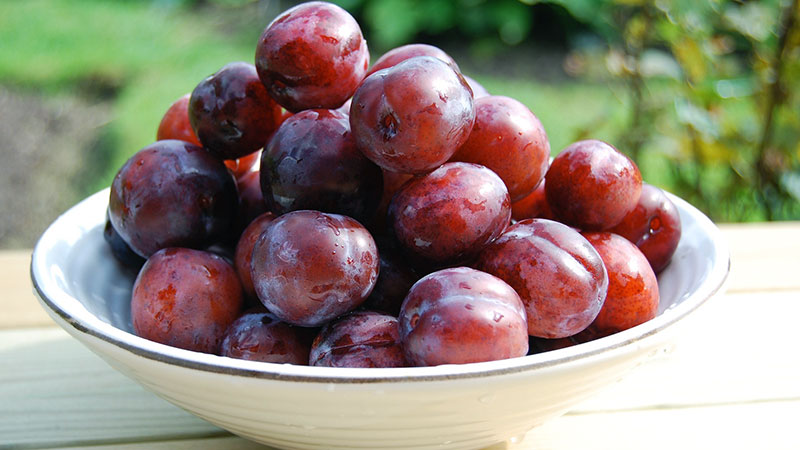Plums, often overlooked in favor of their more popular fruit counterparts, pack a powerful punch when it comes to health benefits.
These small, juicy fruits are not only delicious but also brimming with nutrients that can support overall well-being.
From boosting digestion to enhancing skin health, plums offer a range of advantages that make them a worthy addition to any diet.
Rich in vitamins, minerals, and antioxidants, plums can help combat oxidative stress and inflammation, promoting a healthier body.
Whether enjoyed fresh, dried, or in juice form, incorporating plums into daily meals can contribute to improved health outcomes. Discover the myriad ways these vibrant fruits can elevate your wellness journey.

What Are Plums?
Plums, belonging to the Prunus subg. Prunus genus, are a type of fruit enjoyed worldwide. Known for their juicy and sweet flavor, they come in various colors like red, purple, and yellow.
Plums provide essential nutrients like vitamins A, C, and K. They also contain significant amounts of fiber and antioxidants.
In the United States, dried plums are often labeled as “dried plums” rather than prunes, especially during the 21st century.
Nutritional Profile of Plums
Plums are a nutrient-dense fruit, offering a variety of health benefits in a low-calorie, hydrating package. Here’s a breakdown of their nutritional profile per serving:
- Calories: 30.4
- Water: 57 grams
- Fiber: 0.92 grams (supports digestive health)
- Protein: 0.46 grams
- Fats: 0.18 grams (a low-fat food)
Minerals:
- Calcium: 3.96 mg (supports bone health)
- Magnesium: 4.62 mg (important for muscle function)
- Phosphorus: 10.6 mg (helps with energy production)
- Potassium: 104 mg (vital for heart health)
Vitamins:
- Vitamin C: 6.27 mg (boosts immune system)
- Vitamin A: 11.2 µg (important for vision and skin health)
- Vitamin K: 4.22 µg (essential for blood clotting)
- Folate: 3.3 µg (helps with cell division and DNA synthesis)
11 Health Benefits of Plums

Plums are not only delicious but also boast numerous health benefits due to their rich nutritional profile. Here are 11 key health benefits of consuming plums:
1. Antioxidant Powerhouse
Plums are rich in antioxidants, essential for combating oxidative stress and neutralizing free radicals produced during metabolic processes.
They are also high in vitamins A and C, which boost the immune system and promote healthy skin and tissue repair.
Consuming plums reduces inflammation, improves overall health, and supports heart health, thereby reducing chronic disease risk. Prioritizing plums in diets supports comprehensive wellness due to their potent antioxidant properties.
2. Supports Heart Health
Potassium in plums plays a key role in managing blood pressure. This essential mineral helps reduce strain on the cardiovascular system.
Rich in antioxidants, plums combat oxidative stress, which can damage heart cells. The fiber content in plums contributes to lower cholesterol levels.
Lower cholesterol reduces the risk of developing heart disease. Eating plums regularly promotes better circulation and heart function.
3. Enhances Digestive Health
Plums boost digestive health. They contain 0.92 grams of fiber per fruit. This fiber supports regular bowel movements.
The sorbitol in plums acts as a natural laxative. This compound eases constipation. Plus, the water content in plums helps maintain hydration.
Hydration is essential for optimal digestion. Various vitamins and antioxidants in plums bolster gut health. Vitamin C aids in nutrient absorption.
Vitamin A supports gut lining integrity. Regular consumption of plums can improve overall digestive function.
4. Aids Blood Sugar Control
Plums can help regulate blood sugar levels due to their low glycemic index. Their high fiber content, 0.92 grams per fruit, slows the absorption of carbohydrates, preventing rapid spikes in blood sugar.
Rich in antioxidants, plums reduce oxidative stress on pancreatic cells, ensuring better insulin production and utilization.
Also, compounds like flavonoids enhance insulin sensitivity. This makes plums a suitable addition to diets aimed at maintaining stable blood sugar levels.
5. Promotes Bone Health
Plums contribute significantly to bone health. Their high vitamin K content, found at 6.4 micrograms per fruit, plays a crucial role in calcium regulation and bone formation.
They contain beneficial compounds like phenolic acids and flavonoids that enhance bone density.
Consuming plums helps combat osteoporosis, especially in postmenopausal women, by improving bone mineral density.
They also offer boron, a trace mineral that supports bone metabolism. Integrating plums into one’s diet can, thus, reinforce and maintain strong bones.
6. Boosts Cognitive Function
Plums are rich in antioxidants, such as anthocyanins and quercetin, which protect neurons from oxidative stress and inflammation, thereby enhancing memory and cognitive performance.
The vitamin C in plums aids neurotransmitter production, while vitamin K prevents neuronal damage, supporting cognitive health.
Additionally, plums contain phytonutrients that improve blood flow to the brain, enhancing mental clarity and focus. Including plums in one’s daily diet can significantly contribute to better overall cognitive function and brain health.
7. Supports Skin Health
Plums benefit skin health due to their high vitamin C content. This antioxidant helps produce collagen, a protein essential for skin elasticity and strength.
They contain vitamin A, which supports skin cell production and repair. Antioxidants in plums combat free radicals that cause premature aging and skin damage.
The hydrating properties of plums keep the skin moist and prevent dryness. Regular consumption can result in healthier, more resilient skin. Plums contain nutrients that promote a glowing complexion.
8. Aids Weight Management
Eating plums makes weight management easier. They are low in calories, with only 30.4 calories per fruit. The high water content in plums, 57 grams per fruit, helps keep you full longer.
Fiber, with 0.92 grams per plum, aids digestion and reduces hunger. Plums contain only 0.18 grams of fats, making them a low-fat option. Regular consumption can support healthy weight by reducing overall calorie intake and enhancing satiety.
9. Help Control Cholesterol
Plums lower cholesterol due to their high fiber content, with soluble fiber binding to bile acids and reducing cholesterol absorption.
Rich in antioxidants, plums combat oxidative stress, reduce LDL while maintaining or increasing HDL, and improve cardiovascular health.
Phenolic compounds in plums also reduce inflammation, contributing to better cholesterol management. Adding plums to a regular diet supports heart health.
10. Support Cognition and Memory
Plums contain high levels of antioxidants like anthocyanins and quercetin. These compounds protect neurons from oxidative stress and inflammation, which enhances memory and cognitive performance.
Also, the vitamin C in plums aids neurotransmitter production. Vitamin K found in plums prevents neuronal damage, supporting cognitive health.
The phytonutrients improve blood flow to the brain, contributing to better mental clarity. Incorporating plums into a daily diet effectively prioritizes brain health, making it a valuable addition.
11. Anti-inflammatory
Plums contain potent anti-inflammatory properties. The antioxidants in plums, such as vitamin C and phenolic compounds, combat inflammation in the body. Regular consumption of plums reduces markers of inflammation, promoting overall health.
Polyphenols found in plums, like anthocyanins, further decrease inflammatory responses. By incorporating plums into the diet, individuals can experience significant reductions in inflammation-related conditions.
This fruit serves as a natural remedy to manage and prevent chronic inflammation, supporting long-term wellness.
Potential Risks and Side Effects

Plums are typically safe and nutritious; however, there are potential risks and side effects, particularly when consumed in excess. Here are the primary concerns:
Digestive Issues
Consuming plums can lead to digestive issues for some individuals. The high fiber content may cause bloating or gas if eaten in large quantities. Particularly sensitive individuals might experience diarrhea due to the natural laxative effect of sorbitol.
Kidney Stones
People prone to kidney stones should be cautious with plums that are high in oxalates. Oxalates can contribute to kidney stone formation. Limiting consumption is advisable to prevent exacerbating this condition.
Allergic Reactions
Allergic reactions to plums are rare but possible. Symptoms might include itching, swelling, or difficulty breathing. Individuals allergic to other fruits in the Prunus genus should consult a healthcare provider before consuming plums.
How to Incorporate Plums into Your Diet

Adding plums to your diet offers a tasty way to enhance overall health. Here are some methods to enjoy them daily.
Fresh Snacks
Eating fresh plums is a simple way to benefit from their nutrients. They make an easy, portable snack for work or school. Slice a plum or eat it whole to enjoy its juicy flavor and high water content of 57 grams per fruit. Fresh plums are also great for curbing midday hunger.
Breakfast Enhancements
Enhance breakfast by adding plums to various dishes. Slice plums to top cereals, oatmeal, or yogurt. Mix chopped plums into smoothie bowls for an antioxidant boost from vitamins A and C. Their natural sweetness complements other breakfast ingredients, improving both taste and nutrition.
Salads and Salsas
Include plums in salads for a sweet and tart flavor. Combine chopped plums with leafy greens, nuts, and cheese for a nutritious salad. Plums also work well in salsas. Mix them with tomatoes, onions, and cilantro for a unique salsa rich in vitamins and antioxidants.
Savory Dishes
Incorporate plums into savory dishes for added depth. Roast or grill them with meats like chicken or pork. Their natural sugars caramelize, adding a sweet contrast to savory flavors. Plums also pair well with herbs and spices, enhancing various dishes.
Baking and Desserts
Use plums in baking for delicious desserts. Bake them into cakes, tarts, or muffins. Plum compote can be a topping for ice cream or pancakes. Their high vitamin content improves the nutritional profile of treats, making indulgence healthier.
Frequently Asked Questions
How many plums should you eat a day?
Plums, abundant in Vitamin C, enhance skin complexion and aid in reducing dark spots and scars. Consuming 4-5 plums daily provides a healthy boost, particularly when they are in season.
Are plums a superfood?
Plums are rich in antioxidants that enhance memory and have the potential to eliminate breast cancer cells. Additionally, they safeguard your body’s cells from damage associated with aging, cancer, and various conditions.
What color plum is the healthiest?
Black Beauty plums, distinguished by their dark purple or black hue, are abundant in vitamins A and C, fiber, and antioxidants. These nutrients enhance overall health, bolster the immune system, and contribute to lowering LDL (bad) cholesterol.
Does plums detox your body?
Plums, rich in phenols like anthocyanins, support cognition, bone health, and heart function. All varieties offer detox benefits and contribute to overall wellness.
Is plum high in sugar?
Plums are low in sugar and have a low glycemic index, meaning they have minimal impact on blood sugar levels.
Conclusion
Plums offer a wealth of health benefits that make them a valuable addition to any diet. Their rich nutritional profile supports overall wellness, from improved digestion to enhanced skin health.
Packed with essential vitamins, minerals, and antioxidants, plums help combat oxidative stress, inflammation, and chronic diseases.
Their high fiber content aids in weight management and cholesterol control, while potassium supports heart health.
Also, plums promote bone density and cognitive function, making them a powerhouse for comprehensive well-being.
Incorporating plums into daily meals can significantly boost health, making them a delicious and nutritious choice.
